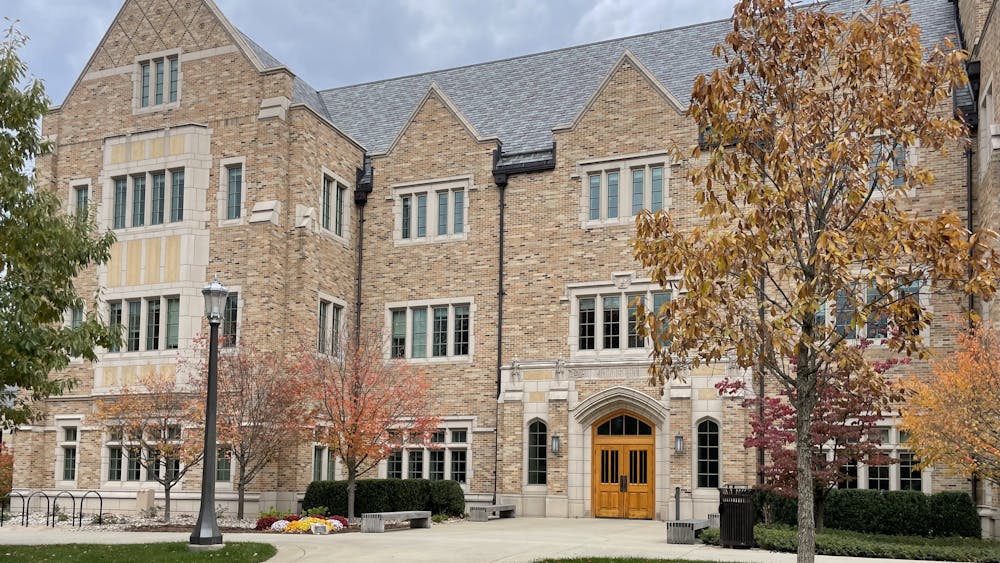In the wake of the COVID-19 pandemic, many Notre Dame-sponsored volunteer trips were cancelled. Although most of such trips were cancelled, one group remained: the Notre Dame chapter of the Global Medical Brigades (GMB). A group of 33 students traveled to Panama on Saturday March 7.
“[The] first two days we [focused on] access to clean water by building a water system,” sophomore and GMB trip leader Joonhee Jang said. “[It was] pretty much manual labor. It was good to learn about water sustainability in Panama. It was a nice change of pace.”
At one point, the brigade inhabited a school, setting up free clinics for locals in Santa Rosa and La Bonga, Panama.
“Most of the people in our group were not concerned about coronavirus,” sophomore Maryann Saba said. “Once we got to Panama, it wasn’t on our minds at all. Even though it should have been something we were anxious about, it was such a good experience it didn’t even cross our minds... At least, not until the first case on Wednesday.”
Although COVID-19 is now a global pandemic, three weeks ago it was much less of a concern to many people. Still taking all necessary precautions, students and leaders traveled to the communities cautiously. They utilized masks, hand sanitizer, wipes and more.
“We didn’t even talk about not going,” Saba said. “I think we were all kind of on the same page [because] we considered it pretty low risk and we all really wanted to do it.”
The early days of the trip were both amazing and humbling, Jang said.
“In small ways we were making a difference,” Jang said. “We made a promise to the community. These people don’t have good access to decent health care. … This was their one opportunity.”
For most of the families he triaged, sophomore Quinn Retzloff said this was their first time seeing a doctor in over a year.
“One elderly woman said she hadn’t seen a doctor in eight years,“ Retzloff said.
Moreover, their living conditions were dangerous too.
“One of our community aids working with us told us that there were 600 people in Santa Rosa, but only 60 houses,” Saba said. ”He gave us an opportunity to see a few houses. Not a single one had a toilet … or floors, just dirt.”
Jang said the way GMB continues to serve communities after one brigade’s trip ends makes the work particularly meaningful.
“The really nice thing about the brigade is that after our brigade goes, future brigades work together to continue providing for these needs,” Jang said. “It’s important that we take these steps to make a positive difference. I really believe we were doing that. The big thing about the brigades is that we aren’t working for the people. We are working with the people.”
Although Jang, Saba and Retzloff said they had positive experiences on the trip, the continued spread of COVID-19 across the globe changed the outcome for some of the brigade.
“It was Tuesday evening after our first day of clinic, an executive from GMB had come to brief us about COVID-19,” Retzloff said. “He reassured us that there was only one case reported in Panama City. ... Then, because we were staying with a local host family, our host parent happened to turn on the TV. An official from the government said seven more cases and one death. … I was content with one case. But eight? And the executive didn't know about it?”
Retzloff said he worried about the potential spread of COVID-19 in the communities the brigade served.
“What happens if we get [the coronavirus] and give it to them? If someone brought it in, it would spread like wildfire,” Retzloff said. “They don’t have cars. The hospital is hours away. They wouldn’t be protected. In those situations, the virus would spread very fast.”
Retzloff, along with 11 other volunteers, and his family decided it would be safest if he returned home the next day. He said he “made the best decision that [he] could with the information presented.”
Saba and Jang were among the 22 volunteers who stayed.
“There were no hard feelings against anyone who decided to leave, and it was made very clear that we should make the decision that would make us and our families the most comfortable,” Saba recalled. “And even after almost half the group left, we didn't feel betrayed or abandoned or anything like that. Most of us were very close to making the same decision so we understood why they did it.”
Saba said she couldn’t feel anything but gratitude and pride.
“I was proud of us,” Saba said. “We all just helped each other. … It was nice to see everyone come together and unite, despite the many obstacles.”
When asked if they regretted their decision to go, Saba, Jang and Retzloff all said no.
“I was pretty impressed with Global Medical Brigades,” Retzloff said. “I will say, however, that it would have been smarter to postpone, knowing what we do now. I think that [GMB] was more concerned with the logistics and the headache, more than safety. Although I applaud their handling of the situation, there should have been more coordination. Everything we do affects our communities. The lack of communication, the nervousness and unaddressed anxiety impacted the service we were doing.”
Saba said the brigade’s week of helping more than 470 patients and handing out over 600 medical kids was the best week of her life.
“It was the perfect thing to do before the mayhem of COVID-19 ensued,” Saba said.
Read More
Trending









